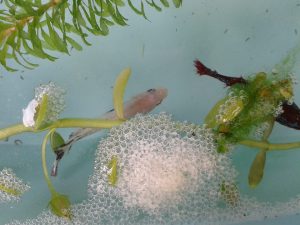
Betta fish begin as small eggs no bigger than 0.03 inches in diameter although within 11 weeks are approximately 1.9 inches long. By seven months old the Betta’s fins have reached maximum growth and it’s length will lie between 3 to 4 inches. It is important to keep in mind that the size and growth rate of your Betta ultimately depends on tank size and conditions along with their lifespan. In captivity the average lifespan of a healthy Betta fish is between 2 to 4 years although some owners claim to have reared there Betta fish to six or seven years old.
Betta Fish Life cycle
The Betta life cycle begins with the mating of the male and female which in many cases can result in injury or death for the female fish. The male Betta builds a bubble nest and once complete the female Betta will lay her eggs onto the male Betta’s tail where he then fertilises them. Once fertilisation of the eggs has taken place, the male Betta will then use his mouth to move the eggs to the bubble nest he has created. It is at this stage that it is vital to remove the female from the tank as males become aggressive towards them after the mating process is complete.
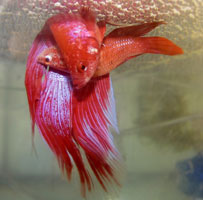
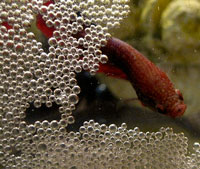
The Betta egg lays at the surface of the water generally in large cluster which are primarily looked after by the male Betta fish. Betta fish eggs actually need oxygen to grow and this is why the eggs must lay close to the surface.Once the spawning process is complete the eggs will take only 24 to 48 hours to hatch. The amount of Betta fry that will hatch cannot be predicted and can be anywhere from 1 to 300. Once the Betta fish hatch they will initially feed off their eggs and will stay close by to the eggs for a further 24 hours. After they have completely eaten their yolk sack, which for some fry takes up to five days, the male parent should be removed to avoid any fighting with the fry.
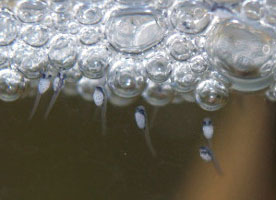
Somewhere between three and six weeks of age the young Betta fish will develop labyrinth organs which allow them to breath at the water surface. It is not until week 8 or 9 of the Betta’s life that they will begin to show their unique color. It is also at this stage that most of your Betta fish will have to be separated from each other due to them sexually maturing and attempting to fight other siblings. After three months old the Betta fish has reached adult hood and will not be able to kept in the same tank as another Betta fish or multiple other species of fish.
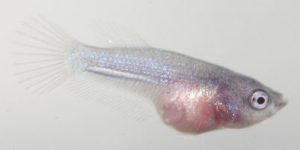
Mating of Betta → Infant (fry) → Youth → Adulthood → Mating of Betta → Approximate three year life expectancy
Betta Life Cycle & Growth Glossary
Adult Betta
Referred to as an adult once they have reached sexual maturity (generally just after three months old.)
Bubble Nest
Made by the male betta from a mixture of saliva and air once they are ready to mate.
Fertilisation
Takes place underneath the bubble nest the male Betta has created. The male and female curl their bodies together (embrace) so that their reproductive organs meet where the female will then release eggs which are fertilised by the male using his milt.
Fry
The term used for baby fish. Betta fish are known as fry up until approximately six weeks of age.
Labyrinth Organs
A special organ the Betta fish possesses which allows it to breath air from above the waters surface in conjunction with their gills.
Sexual Maturity
Betta fish reach sexual maturity at three months old which is when you will also see a change in behaviour towards other fish.
Betta Fish Eggs & Fry
The following diagram shows pictures and measurements of the exact growth rate of a Betta Fish from one day old to eleven weeks old.
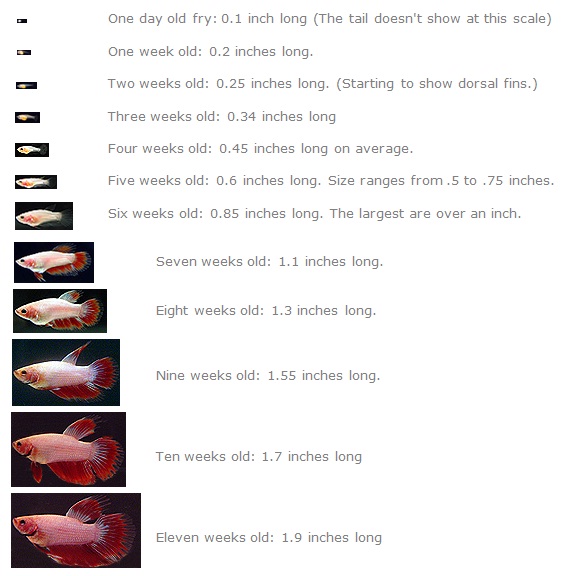
betta fish should live at least 4 years.
What breed of betta are the baby bettas usually at pet stores? Such as Petco, or Petsmart, etc.
Usually imbellis ( king Betta)
Pet shop big ones that are cheap are Veil tail. King Bettas are not Imbellis. Just ex-large Plakat (short tail) Bettas
I’ve been looking into betta breeding, and I wanted to know what kind of bettas are best for beginner breeders?
Thanks!
Any betta will do i have breed bettas alot and anykind will do as long as your betta is a pair
How old a Betta fish has to be to lay eggs ?
@Kamila, Usually a few months old.
one day old betta fry food?
Vinegar eels, baby brine shrimp, grindel worms
At one day old theyre still attached to the yoke sac, which is what they feed on for the first 3 days. BEFORE you breed bettas do the research, you need to start a micro worm culture at least a week before breeding, & feed the parents a live food diet a week before & after (the male wont eat while tending to the fry.
The Bettas you find in Petsmart, petco, Wal-Mart, and all petshops are all Betta Splendens even the King/Giant Bettas. The King/Giant Betta was developed from breeding larger and larger Plakat, short finned betta splendens in 1997.
If I picked up 2 random bettas (which I did) , I was told the male was a veil tail (i think he looks more like a spade tail though but idk)…anyways, if I were to mate the male w/unknown female, will all the fry be veil tail or will I get other types maybe